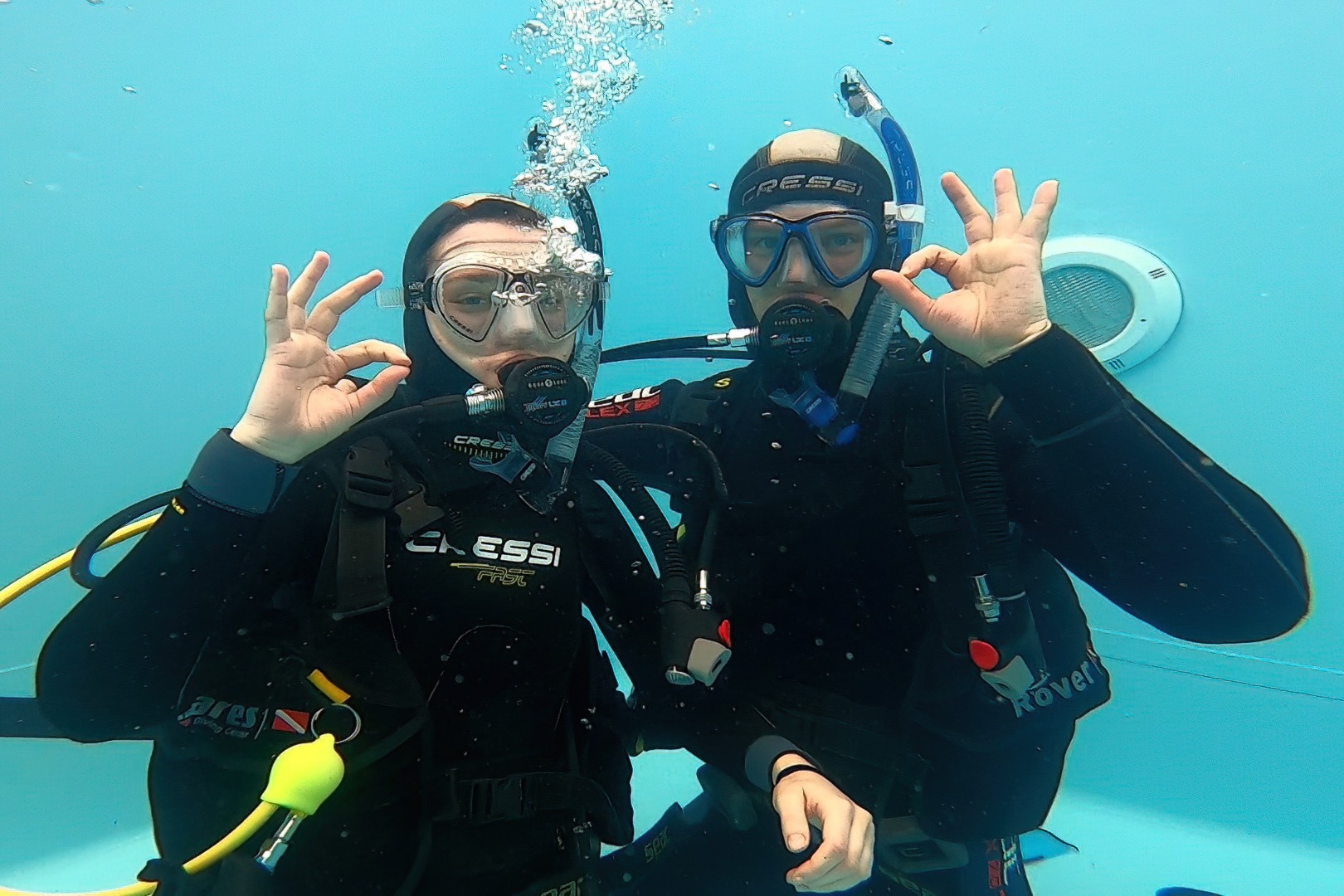In order to start your first diving experience and start underwater research through diving, freediving or snorkeling, you must understand that it is a very exciting activity that requires both dedication, time and good physical preparation, a good foundation of knowledge is needed. Prospective divers need to make a decision about where to get their first scuba diving certification, understand the importance of getting a good foundation of knowledge.
In this article, we delve into that decision making process by considering the various pros and cons of getting your first scuba certification “PADI Open Water Diver” at home or on holiday, for example in Egypt, Cyprus, Malta or Tenerife. Drawing on the wisdom of experienced diving expert, diving coach and instructor Walter Preimans, we unravel the considerations for those who want to explore the mysteries beneath the waves.
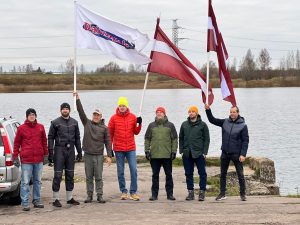
Table of Contents
Pros and cons of scuba diving training at home
The advantages are as follows
- A familiar environment that promotes good fundamental learning: Learning in a familiar environment makes for a more comfortable and less stressful learning experience. Familiarity with local conditions and equipment can facilitate a smoother learning process.
- Optimal learning conditions: Latvia offers a diverse training environment, including pool lessons and open water lessons. The controlled pool setting allows for gradual skill development, while the open water experience creates real challenges.
- Flexible Schedule: Homeschooling provides flexibility in scheduling lessons without vacation time restrictions. This flexibility can be especially beneficial for individuals with busy schedules.
- Community integration and making new friends: Local training promotes a sense of community among divers. By building connections with diving enthusiasts in the local area that can enhance the overall diving experience.
- Cost-effective: Learning to dive at home often proves to be more cost-effective as there are no additional expenses related to travel and accommodation.
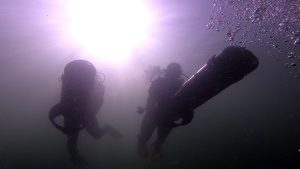
Cons of underwater training in Latvia
- Dependence on the weather: The weather in Latvia can be variable, however, there are practically no severe adverse conditions that can affect the frequency of open water lessons, usually four, in the "PADI Open Water Diver" course. Bad weather conditions could extend the total training period.
- Limited visibility, usually 2.3-5 meters is sufficient for training: the Baltic waters may not offer the crystal clear visibility of some exotic locations. While this provides unique challenges, it may not replicate the conditions that divers will encounter in tropical destinations.
- Moderate water temperature is adjustable with wetsuit thickness: The cold water temperature in the Baltic Sea can be a challenge for some divers. Adaptation to temperature may require additional effort and adjustment.
- A less exotic environment: Homeschooling may lack the appeal of exploring vibrant coral reefs and diverse marine life in more tropical locations, but there are native fish and various underwater objects.
- Potential Distractions: Familiarity with the environment can be a distraction, as divers may be tempted to focus on their daily lives instead of fully immersing themselves in the training experience.
Pros and cons of diving training abroad

Advantages of training while traveling
- Exotic locations: learning to dive in places like Egypt, Cyprus, Malta or Tenerife gives you the opportunity to explore exotic underwater landscapes with stunning marine biodiversity.
- Optimal weather conditions: Tropical destinations provide more favorable weather conditions, making for a more predictable and enjoyable learning experience.
- Clear visibility: Clear waters in these areas improve visibility, allowing divers to fully appreciate the underwater beauty and practice skills in optimal conditions.
- Dive Tourism Experience: Studying abroad immerses divers in the world of dive tourism, exposing them to different cultures and diving communities from around the world.
- Focused learning: Away from the distractions of everyday life, divers can fully focus on training, accelerating the learning process.
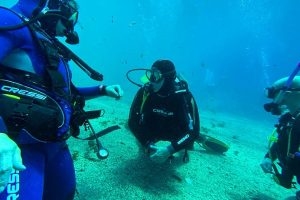
Minuses
- Cost: Studying abroad can be more expensive due to travel, accommodation and possibly higher course fees.
- Limited local connections: Training in a foreign location can lead to fewer connections with local divers, thus affecting the development of a supportive diving community.
- Intense schedule: Shortened vacation time may require a more intense training schedule, which can lead to stress and information overload.
- Cultural and language barriers: There can be serious communication problems and cultural differences that affect overall comfort and understanding during training.
- Limited adaptation to local conditions: Divers trained abroad may find it difficult to adapt their skills to their home environment, which may have different conditions and challenges.
A diving instructor's point of view
Master scuba diver, PADI freediving trainer Valters Preimanis emphasizes the facts: “Both options have their advantages, but it ultimately depends on the individual's wishes and priorities. Training at home provides a solid foundation of knowledge gained in local diving conditions, usually a diver gets a very good foundation of knowledge and much more diving than on a trip, while studying abroad provides a unique and exciting experience, it should be expected that the diving lessons will be very intensive, there will be little time for travel and the diver abroad will be under increased stress. It is very important to consider your comfort level, budget and the diving experience you want to have.”
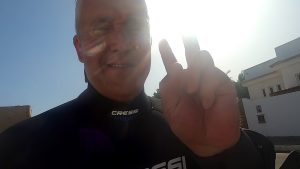
Conclusion
In the field of underwater exploration, the choice between training at home and training abroad is a personal journey. Each path has its pros and cons, and the decision depends on factors such as personal preference, budget, and desire for a cultural or exotic diving experience. Regardless of the choice, the goal remains the same: to become a passionate and skilled diver ready to explore the wonders that lie beneath the surface.
PADI DIVING COURSES
If you have no experience, start with PADI Open Water Diver course, which is the foundation and knowledge base for all subsequent courses. We have been preparing, training and certifying divers for 20 years. We offer <30 different specializations in diver training and issuing international PADI underwater diving certificates. Practice in the diving club "Divings" for diving professionals Divemaster (GO-PRO - from beginner to PADI Divemaster). We organize diving trips, follow us!
We train in diving, in a special diving pool in Riga, Mārupe district (application required, phone/WhatsApp 220-77-202)
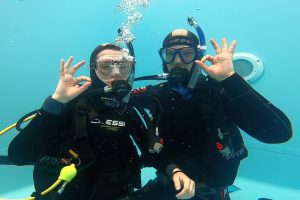
Latvian diving instructor Valters Preimanis, who teaches diving training at the DIVINGS club, won the PADI Elite Instructor Award (2020 PADI Elite Instructor Award) for his contribution to the development of diving. Instructor Valters Preimanis has been awarded PADI Elite Instructor Award 2018, 2019, 2020, 2021 and 2022 award.
References
- Professional Association of Diving Instructors (PADI) Open Diver Course Guide.
- Diving safety and health: diving in Baltic Sea conditions, 2022.
- The Complete Diver: The History, Science, and Practice of Scuba Diving by Alex Brilske, 2018.

